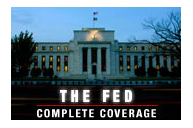Janet Yellen will be forced to defend the Federal Reserve's ultra-easy monetary policy when she faces senators later this week, but critics have little hope of sinking her nomination to become the first woman to ever lead the U.S. central bank.
Nominated by President Obama to succeed Fed Chairman Ben Bernanke when his term expires in January, Yellen will have to endure plenty of heated anti-Fed rhetoric from Republicans on Thursday, when she appears before the Senate Banking Committee. The committee, which will vet her for the job before deciding whether to send her nomination to the full Senate for approval, will quiz Yellen from 10 a.m. on November 14.
Related: Janet Yellen: Brainy, Brave and Brooklyn Strong
The central bank's No. 2 official can at least look forward to warm words from Democrats, who hold 12 of the 22 seats on the panel and who appear certain to give their backing.
Since she only needs support from a handful of Republicans to muster the 60 votes necessary to clear procedural hurdles when her nomination reaches the Senate, Yellen should be confident of confirmation. Democrats control the chamber 55-45.
The timeline is uncertain, but even critics think she will get enough bipartisan support to take the Fed's helm. "The bar is going to be 60 votes. That is clear. And she will probably surpass that bar," Louisiana Republican David Vitter, who has slammed the Fed's easy money policies, told Reuters last week.
Republicans, particularly Tea Party conservatives, have been scathing of the Fed's dramatic measures to aid the U.S. economy after the severe 2007-2009 recession and financial crisis, arguing its actions risk stoking financial instability and inflation.
Related: What You Need to Know About Janet Yellen
The Fed has held interest rates near zero since late 2008 and has quadrupled its balance sheet to $3.8 trillion through three huge rounds of bond purchases, or quantitative easing. As a result, Yellen's reputation as a policy dove will be under intense scrutiny. She has argued that the high cost of long-term unemployment might warrant allowing inflation to temporarily rise above the Fed's 2 percent goal.
"I'm concerned about what seems to be a continuing (of) free money policy forever. I think we're building up inflationary pressure in the future," said Vitter, who sits on the banking panel and voted against Yellen as Fed vice chair in 2010. "A lot of conservatives, including me, have concerns about that."
In an effort to gain leverage on other issues, several Republicans have threatened holds on her nomination that would require 60 votes to overcome. South Carolina's Lindsey Graham wants more information about an attack on a U.S. diplomatic mission in Libya in 2012, while Kentucky's Rand Paul wants to force a vote on his bill to open the Fed's monetary policy decisions to congressional audit. Vitter is a co-sponsor of Paul's legislation.
None of the holds are expected to be placed because of a dispute over Yellen's qualifications, but that will not spare her from criticism.
Hawkish Credential
However, Yellen can point to at least one hawkish credential - when she was one of the few Fed officials who stood up to Fed Chairman Alan Greenspan in 1996 and urged him to consider raising interest rates to quell an early inflation uptick.
Related: Fed Still a Source of Anxiety If Rates Keep Rising
In any case, Yellen's deep understanding of monetary policy and intimate knowledge about the Fed mean she is unlikely to be an easy target for senators wishing to score political points.
"Yellen has given a lot of thought to these issues and I think she will perform very well before the committee," said Tony Fratto, a former spokesperson for President George W. Bush. "If they think they are going to be dealing with someone who is meek and will back down to them - I have never seen Janet Yellen back down to anyone in an intellectual debate."
Furthermore, any senator who wants to vent about the Fed during the hearing needs to keep careful control if he wants to avoid appearing to bully the 67-year-old economist. There are only three women among the 22 members of the panel. None of them are Republicans.
Financial markets will keep tuned for hints about the future course of U.S. monetary policy, including her views on the benefits of continued asset purchases given speculation that officials will keep buying bonds into next year. She voted to keep buying bonds at a $85 billion monthly pace at the Fed's meeting in October, but will take care not to speak on behalf of the Fed's policy-setting committee, which next gathers on December 17-18.




